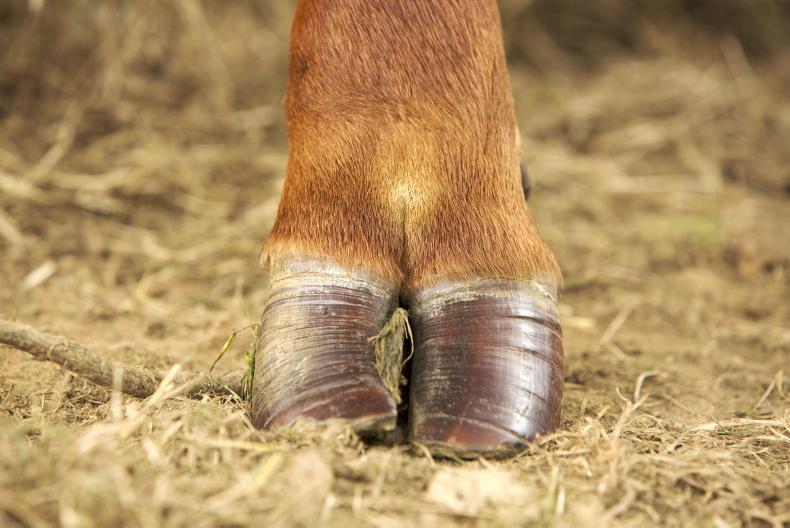German authorities confirmed an outbreak of foot-and-mouth disease (FMD) on a farm in Brandenburg on Friday.
The outbreak involved a herd of 14 buffalo, three of which tested positive for the contagious virus, the state’s agricultural authorities have said.
The remainder of the herd have been culled and the carcases destroyed on the back of this discovery.
It is understood that the first water buffaloes tested on the farm were suspected fatal cases of bluetongue – a virus that has swept across mainland Europe since September 2023.
The three animals tested negative for bluetongue but positive for FMD.
Many animals in the small herd of water buffalo are understood to have been showing signs of illness.
Germany has been free of FMD since 1988 and authorities there are carrying out rigorous testing of the virus in their attempts to ascertain its yet unknown origin.
FMD is endemic to parts of the Middle East, Asia, Africa and regions of South America.
Although it poses no human health or food security risks, humans can spread the virus if in contact with infected livestock or wild animals, as well as with contaminated animal products.
Animal movements
A movement ban on FMD-susceptible species – such as cattle, sheep, pigs and goats - has been temporarily put in place in the state of Brandenburg, near Berlin, for a 72-hour period.
This means that all livestock movements have been halted as a precautionary measure, including an interim stop to animal movements to slaughter plants.
The transport of slurry and farmyard manure has also been halted for the duration of this period.
Further to this, a 3km protective zone has been set up around the farm where the cases were confirmed, where movements will remain prohibited after the temporary restriction is lifted.
Further restrictions apply to moving meat or milk out of the zone, as well as to livestock breeding within the zone.
A larger 10km observation zone has also been established, with restrictions on moving livestock and animal products out of this zone.
The outbreak occurred in the Märkisch-Oderland district, which borders Poland.
The Department of Agriculture in Ireland has confirmed that there have been no animals susceptible to FMD imported into Ireland from Germany since 1 November 2024.
It said this was before the confirmed Brandenburg cases would have been infected with the virus and the last import may have been some time before then, given the bluetongue movement restrictions in place in many regions of Germany.
Read more
Foot-and-mouth disease: what you need to know
Minister issues foot-and-mouth disease warning after outbreak in Germany
German authorities confirmed an outbreak of foot-and-mouth disease (FMD) on a farm in Brandenburg on Friday.
The outbreak involved a herd of 14 buffalo, three of which tested positive for the contagious virus, the state’s agricultural authorities have said.
The remainder of the herd have been culled and the carcases destroyed on the back of this discovery.
It is understood that the first water buffaloes tested on the farm were suspected fatal cases of bluetongue – a virus that has swept across mainland Europe since September 2023.
The three animals tested negative for bluetongue but positive for FMD.
Many animals in the small herd of water buffalo are understood to have been showing signs of illness.
Germany has been free of FMD since 1988 and authorities there are carrying out rigorous testing of the virus in their attempts to ascertain its yet unknown origin.
FMD is endemic to parts of the Middle East, Asia, Africa and regions of South America.
Although it poses no human health or food security risks, humans can spread the virus if in contact with infected livestock or wild animals, as well as with contaminated animal products.
Animal movements
A movement ban on FMD-susceptible species – such as cattle, sheep, pigs and goats - has been temporarily put in place in the state of Brandenburg, near Berlin, for a 72-hour period.
This means that all livestock movements have been halted as a precautionary measure, including an interim stop to animal movements to slaughter plants.
The transport of slurry and farmyard manure has also been halted for the duration of this period.
Further to this, a 3km protective zone has been set up around the farm where the cases were confirmed, where movements will remain prohibited after the temporary restriction is lifted.
Further restrictions apply to moving meat or milk out of the zone, as well as to livestock breeding within the zone.
A larger 10km observation zone has also been established, with restrictions on moving livestock and animal products out of this zone.
The outbreak occurred in the Märkisch-Oderland district, which borders Poland.
The Department of Agriculture in Ireland has confirmed that there have been no animals susceptible to FMD imported into Ireland from Germany since 1 November 2024.
It said this was before the confirmed Brandenburg cases would have been infected with the virus and the last import may have been some time before then, given the bluetongue movement restrictions in place in many regions of Germany.
Read more
Foot-and-mouth disease: what you need to know
Minister issues foot-and-mouth disease warning after outbreak in Germany







 This is a subscriber-only article
This is a subscriber-only article










SHARING OPTIONS: